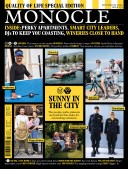
Issue 135
Monocle’s July/August issue is a celebration of the city – it spotlights the cities, leaders and luminaries shaping urban life for the better. We’ve doubled down on our reporting and scoured the globe for outposts of opportunity worth uncovering. Plus: we profile 20 urban projects that are adding a sense of purpose to planning: from skinny parks in Seoul to libraries in Nairobi and somewhere to swim in Stockholm.
In This Issue
Oops! No content was found.
Looks like we no longer have content for the page you're on. Perhaps try a search?
Return Home

